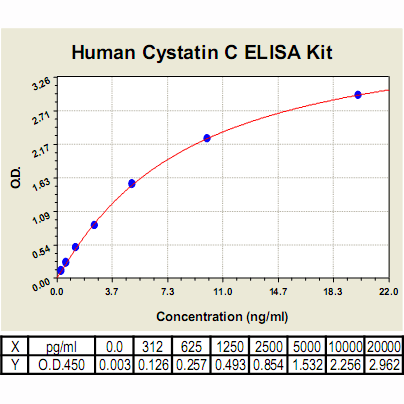Cystatin C ELISA Kit, Human
Human Cystatin C ELISA Kit: Human Cystatin C ELISA Kit
Size: 96 Wells
Price: $619.00
Description
secretion. Cystatin C shows the highest affinity and the fastest inhibition of all cystatins toward lysosomal cysteine proteases in general, and has a widespread distribution in human tissues and body fluids. Cystatin C inhibits family C1 cysteine proteases through tight and reversible binding in a substrate-competing mechanism, resulting in an equimolar complex with the protease. Human type 3 cystatins comprise L- and H-kininogen, which together with cystatin C and alpha2-macroglobulin are the most important plasma inhibitors of cysteine proteases.1
Cystatin C is a non-glycosylated, basic protein (isoelectric point at pH 9.3) consisting of 120 amino acid residues. As a secreted cysteine protease inhibitor, Cystatin C has a broad spectrum of biological roles in numerous cellular systems, with growth-promoting activity, inflammation down-regulating function, and anti-viral and anti-bacterial properties as well as function in bone resorption, neutrophil chemotaxis. It is involved in numerous and varied processes such as cancer, renal diseases, diabetes, epilepsy and neurodegenerative diseases such as Alzheimer’s disease (AD). It also serves as a potent inhibitor of cathepsin B and other human lysosomal cysteine proteases. Cystatin C is also known to be a better marker for renal injury than creatinine.2 By inactivating cathepsin protease activity, cystatin C inhibits cancer cell invasion and metastasis. Abnormal serum levels of cystatin C or cathepsin B/cystatin C complex have been suggested as diagnostics and prognostic indicators for cancers of skin, colon and lung. Cystatin C has been suggested to play an important role in neuroendrocrine differentiation of prostate cancer. More recently, serum cystatin C has been proposed as useful marker of increased osteoblastic activity associated to bisphosphonate treatments in prostate cancer patients with bone metastasis.3 In addition, it has been studied for its role in predicting new-onset or deteriorating cardiovascular disease. Cystatin C also seems to play a role in brain disorders involving amyloid (a specific type of protein deposition), such as Alzheimer’s disease.4
2. Sarkar, P.D. et al: Ind. J. Clin. Biochem. 20:139-44, 2005
3. Wegiel, B. et al: PLoS ONE 4:e7953, 2009
4. Deng, A. et al: Am. J. Path. 159:1061-1068, 2001
Details
| Cat.No.: | CL0678 |
| Target Protein Species: | Human |
| Range: | 312 pg/ml – 20000 pg/ml |
| Specificity: | No detectable cross-reactivity with other cytokines |
| Storage: | Store at 4°C. Use within 6 months. |
